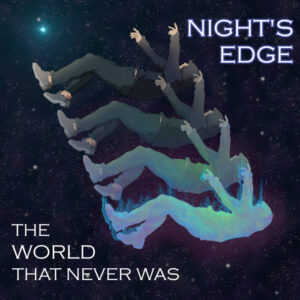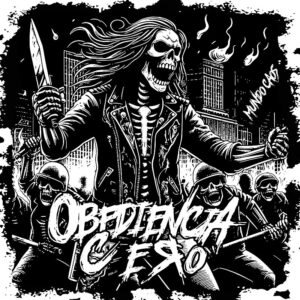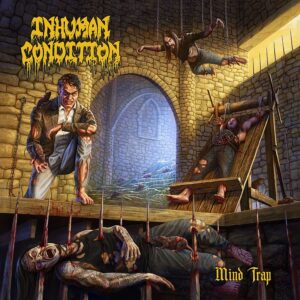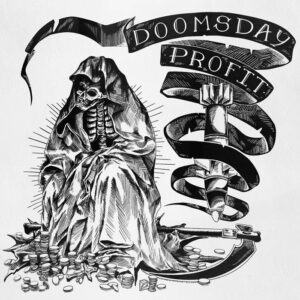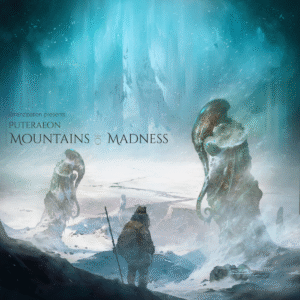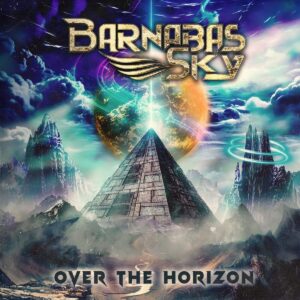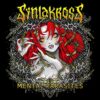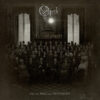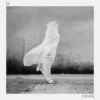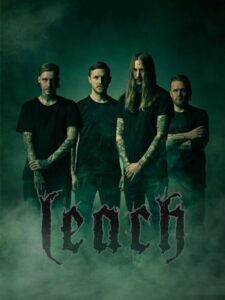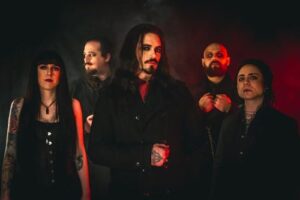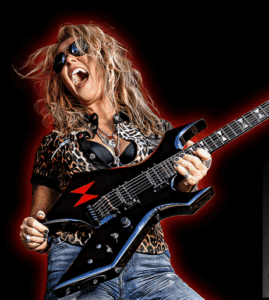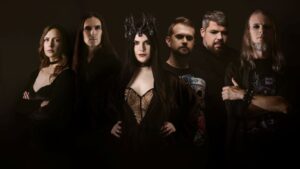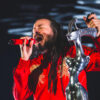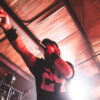Katharsis
Incantatem
•
February 1, 2021

If you take apart the phrase "modern folk metal" and reduce it to its individual words, it will tell you exactly what Hamburg's INCANTATEM - and their stellar second album, "Katharsis" - is. It is "folk" in its vibe, in the sing-along, repetitious richness of their carefully-crafted choruses, in the odd 6/8 tempo here and there, in the buttery tone of Johanna's cello. It is "metal" courtesy of Christopher's crunching, biting riffing and Thomas' aggressive but always appropriate drumming.
And it is "modern" in that it lacks the stereotypes of both genres - particularly with Malte's decidedly "non-metal" singing. When you visit their spartan website, too, "modern" is the first word that indeed comes to mind; the members are somberly, stylishly dressed on the opening page with no overly "metal," or even folk, trappings. Regardless of what you call them, they have a most delightfully annoying quality of leaving you wanting more with each track of this very fine album. Their debut full-length was "Animus et Anima" in 2018; their EP "Durch die Nacht" was released in 2014.
"Katharsis - Intro" serves as just that - a moment of throaty, buzzing programming, an eerie keyboard melody, and precise low-end drumming that flows into a long, growling, ringing riff and more assertive drumming that eases without pause into "Seuche" ("Plague"), notable for its beefy but yet light swing (it has heft and bottom, yes, but lots of air and space too; it's not oppressive). Malte's voice is a supple, airy, well-enunciated tenor. The layers of voices (including whispers), the picked-up tempo, and the keyboards that almost mimic a choir mark the chorus (with the riff and Thomas' tastefully light drumming well subdued behind it). The solo is interestingly bright and undermixed, the drumming becoming more noticeable.
There are tracks that skew definitely to one style or the other, metal or folk. "Loreley" (the title translated means "luring rock" or siren, like the old Greek myth of the singers who lured men to their doom) is absolutely the latter, with Johanna's lovely cello melody that leads into a stunning 6/8 given weight by guitars and double-kick drumming. It's just Malte's intimate, subdued voice and Thomas' bouncy drums in the first verse; in the second, they take greater liberties and add more flourishes and layers. The pre-chorus incorporates vocal harmony, then the chorus takes that and adds the cello melody, the faint riffing, that ever-so-light drumming - it's just divine. That quick little modulation before the cello part is gorgeous (occurring before both the second verse and the bridge), and the bridge itself is more erratic in groove but with the same vocal melody. Malte's voice is insistent and urgent, hinting that something important is happening in the action, before they give us that wonderful chorus one last time.
"Diamant" is just as definitely metal, a complete change of pace from "Loreley," with its tinny cymbal intro that segues into a catchy, neck-snapping groove and muscular riffing. Malte's voice really works well in this context for some weird reason, especially in yet another sublime chorus that slows and adds cello and vocal overdubbing - it's so rich and warm and soothing, the drumming absolutely perfect - then it picks back up into the same tempo for the second verse. Nothing is jarring; they do everything completely naturally. Later, Johanna's cello gets a solo on the initial melody and its variants.
"Hof der Wunder" (or "Court of Miracles," done with Eric Fish of the German rock band SUBWAY TO SALLY) starts off funky, just snare (Thomas has great feel and touch, did I mention?) and feedback-laden guitar, then a brawny chug accompanied most effectively and delicately by cello. It all has a very slight Eastern quality. The chanted vocal right in your ear at the end of each verse (first Malte, then Eric), is almost frighteningly intimate. Another just fabulous chorus has a satisfying swing, lots of vocal harmony and that cello; it just doesn't let you go, ending on a breath before the next verse. The bridge is riffing, elastic plays on the groove without pause, and more vocal tradeoffs between Malte and Eric before that terrific chorus once more. It ends on the last words in the chorus in that cold minor key - that unresolved quality is really elegant.
"Schwingen'' (roughly "Swinging") has almost a tango tempo in its syncopation, Johanna's pizzicato cello, Malte's lilting voice, and Thomas' regimented drumming - it's sparse and light and definitely, well, "swinging," before the bottom-end drums kick in more fully and the guitars accompany the cello. The supremely melodic chorus is so well-drawn, the overdubbed harmonies adding warmth and lushness. The bridge changes keys just a bit, playing on the lines of the chorus; Malte's voice is undermixed, then he comes to the fore for a line, then it's back into the full mix of the chorus. Johanna wraps it up with a sublime cello take on the melody; it's there, but she embellishes it just enough, making it familiar yet distinct at the same time. And it's just exactly precisely long enough - they are such disciplined songwriters, each little change in tempo, in vocal treatment, in instrumentation handled with precision and care.
"Das Monster in mir" ("The Monster In Me") rather logically starts with techno-sounding programming and a foreboding melody that vaguely sounds like piano before drumming and riffing in perfect lockstep tandem joins in. This is another one that's almost purely metal, but that cello is there on a clearly distinct melody, as is the programming and Malte's oddly deadpan but completely effective singing (he's not completely a "singer," per se, but he's a great interpreter). The verses are lovely and terse, the plucked cello and programming and restrained drumming adding to that vaguely evil feel. And at the risk of repeating, what is it with them and great choruses? Christopher's crunchy solo features some very TOM MORELLO-like plays with feedback and effects before the whole thing goes back to the chorus and the same riffing from the start, and it ends on Malte's tortured rasp.
Cymbals and drumming and a quick riff and Malte's low-key, nearly spoken vocal begin "Wie Feuer '' ("Like Fire"). It airs out in the pre-chorus, where the arrangement is open and full of space, and the chorus again is stunning - they might all be a bit similar, but they sound so good and the melodies are so unforgettable. After the second verse, you expect a chorus but you don't get it - you get a pause and a bridge instead, with drawn-out ringing riffing and a repeated lyric - then the chorus. That brief bit of cello with the vocals on the last line is just enough, and it ends as it started, with a pre-chorus, the chorus, and that opening segment with the drums pounding it out. The brevity and immediacy of their songs is really admirable.
The opening riff of "Ziechen" ("Signs") has almost a punk feel, slamming along with uninhibited glee. As throughout, Malte's voice just works so well here - he has little variation in it, no real vibrato, no "technique," as it were; he kind of just carries a tune, more or less, but it doesn't matter. It works. The pre-chorus lifts so smoothly into the chorus, just with alternated harmony (one line without, one with - it's so subtle, but it's a little touch that matters), before it opens up. The programming under the vocal in the chorus is another aural treat. The bridge is a slower stomp, back to a verse, and that chorus, and it hurtles to a close while you beg for more.
"Kinder des Krieges" (roughly "Children of the War") is undermixed guitar and drumming before it blasts into a hitching groove and a smartly paced tempo that it maintains the rest of the way, leading into each haunting verse. A little feedback guitar arrives in the third verse and the bridge, where the cello takes the melody of another powerful chorus. A child's voice (or voices) sings the final one, which makes sense considering the title - it's eerie, as if coming from beyond the grave - and it ends with the same voices and a chilling bit of programming accompaniment.
"Das letzte Bild" ("The Last Picture") has a sprightly opening tempo and a bright melody that sounds like it's coming from Mella's bass as the riffs carry on behind it, which is lovely. A "metal" bridge, with lots of feedback and blast beats and syncopation, quiets to cello and guitar and drumming like a heartbeat (the exact opposite of what just preceded it). Guest vocalist Daniel "Barry'' Brach adds a pleasing and appropriate and not overdone death metal growl to the blend. The breakdown is programming and insistent guitar and completely in-the-pocket drumming and Malte's voice and Daniel's scream, then at last the full chorus, sweeping and grand. It modulates beautifully, with the vocal overdubs, the growling, the drumming - it's stunning, purging and cathartic and emotional, dying away on a keyboard melody. This one throws you for a most pleasant loop - it's unexpected but it's still within the realm of what they've been doing throughout.
The tender closing ballad, "Trost" ("Consolation"), begins with piano or plucked strings, chiming and light and pleasantly, vaguely discordant, like a nursery rhyme or a music box. Malte's voice, accompanied by those sounds, is intimate in your ear, fearlessly vulnerable - he has beautiful diction and pronunciation, he never strains, everything is firmly in his range, and he has a great sense of drama. His voice sweetens and rimshot drumming is added just briefly in a stripped-down version of the chorus, then it returns to the verse idea, the drumming and cello intensifying along with his voice. The chorus in earnest is a dream, the guitar solo aching and sad - when they add the vocal harmony, it's heartbreaking. It's so short as to be almost frustrating - its beauty is short-lived, which makes it all the more precious.
So instead of finagling over exact genre definitions, enjoy the superb "Katharsis" for what it is - terrific songs performed with great skill and sensitivity.
10 / 10
Masterpiece
Songwriting
Musicianship
Memorability
Production

"Katharsis" Track-listing:
1. Katharsis - Intro
2. Seuche
3. Loreley
4. Diamant
5. Hof der Wunder
6. Schwingen
7. Das Monster in mir
8. Wie Feuer
9. Ziechen
10. Kinder des Krieges
11. Das letzte Bild
12. Trost
Incantatem Lineup:
Malte Storjohann - Vocals
Christopher Ried - Guitar
Mella Winterfeld - Bass
Thomas Giesel - Drums
Johanna Heesch - Cello
More results...
